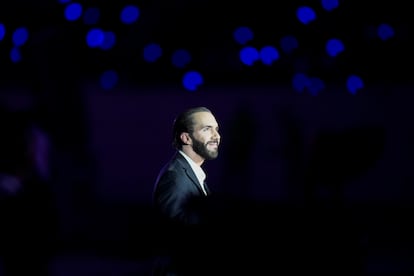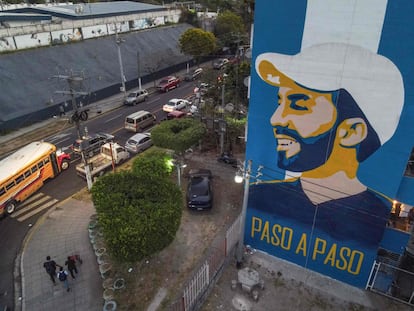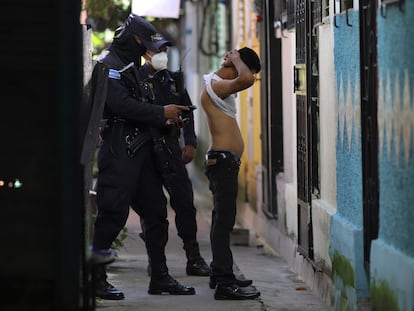Bukele, the iron fist leader without rival in El Salvador’s elections
The president is set to be re-elected next Sunday thanks to his great popularity in the country, where he is esteemed for taking down the gangs despite the high cost to human rights


Salvadoran President Nayib Bukele likes to joke about himself. When he graduated, he defined himself in his school yearbook as a “class terrorist.” It was his way of joking about what it meant to be of Palestinian origin in a country like El Salvador, which is dominated by a white class with European roots. His way of dealing with adversity has not changed much since then. Two years ago, as criticism over his authoritarian government intensified, he changed his Twitter bio to “the coolest dictator in the world.” Across the world, Bukele has won over support, especially from young people who watched his cinematographic, well-produced videos showing hundreds of gang members shackled in prison. His decision to call himself the “cool dictator” of this small nation of 6.3 million people might be funny, if it weren’t for the fact the international community has been increasingly alarmed by the weakening of democracy in El Salvador.
Bukele — who rose to power four years ago — is overwhelmingly popular both inside and outside of El Salvador. According to the polls, he will be re-elected the president by a wide margin on Sunday, February 4. Indeed, his win in the first round is forecast to be so convincing that a runoff vote will not be needed. If the polls are correct, Bukele — with his gelled back hair, carefully trimmed beard, jeans, backwards cap and voice trained to captivate crowds — will continue to be a key figure in the daily lives of Salvadorans until at least 2028. Afterward, only time will tell. Bukele is running for re-election despite the fact that up to six articles of the Salvadoran Constitution expressly prohibit consecutive terms. However, the Constitutional Chamber — a body controlled by Bukele — has made a more than questionable interpretation of the law in which Bukele can stand for re-election if he leaves office six months earlier. That is what Bukele has done. NGOs and nations have criticized his methods, but the Salvadoran president has dismissed these allegations, arguing that his critics are trying to undo the good work he has achieved.
Bukele has had undeniable success in terms of bringing back security, but at what cost? In 2019, shortly after becoming president, Bukele reached a pact with the two main gangs of El Salvador: the Mara Salvatrucha 13 (MS-13) and Barrio 18 (18th Street gang), which started in Los Angeles and spread to the Central American country when the U.S. deported gang members en masse at the end of the 1970s. But in March 2022, he broke the agreement and established an emergency regime. In the days prior to the state of exception, 80 murders had been recorded, with terror spreading across the country. But that changed overnight. Salvadoran authorities took an iron-fist approach, and have since detained more than 70,000 people. Peace now reigns in neighborhoods that gangs had ruled for decades. In El Salvador, a country used to violence, extortion payments amounted to 3% of GDP and the annual cost of violence was a stratospheric 16% of GDP. In 2023, according to questioned figures, El Salvador registered 2.4 homicides per 100,000 inhabitants, one of the lowest rates in Latin America. Before Bukele came to power, El Salvador had the highest homicide rate in the world: 103 homicides per 100,000 inhabitants.
Visit any neighborhood in San Salvador that has been freed from gangs, and residents will rush to praise Bukele. The president also has an exaggerated view of his achievements. “Bukele is bold, complicated, authoritarian, he thinks fast and has the ability to make decisions regardless of the means. He has no scruples,” says someone who worked very closely with him by phone. Bukele’s goal to enforce the law at all costs has undermined human rights, according to Human Rights Watch, which has accused the government of committing widespread abuses during the emergency regime. Other NGOs have documented torture, arbitrary detentions — in one case, against a boy with Down syndrome — and suspicious deaths in prisons. Lawyers and relatives of prisoners complain that they have no contact with the inmates, and that the detainees are given virtual trials without witnesses. But Bukele argues his system is infallible: he claims that the margin of error in arrests is 1%.

Gustavo Flores-Macías, a professor specialized in governments and public policies at Cornell University in the United States, believes that the elections in El Salvador will serve as a referendum on Bukele’s measures. Once the opposition is destroyed, Bukele’s party Nuevas Ideas (New Ideas) will once again have a majority in the National Assembly, meaning that the president will continue to hold all the power. The country, right now, is his. “The results in terms of public security have exceeded the wildest predictions, but the cost in terms of human rights and individual rights has been considerable,” explains Flores-Macías, who points out that due process is ignored, and that authorities can imprison anyone they consider suspicious with near complete freedom.
But according to the academic, Salvadorans seems to think that the results in terms of security are well worth the cost to human rights and the weakening of counterweights to the presidency, such as the National Assembly and the judiciary. “If Bukele wins by a large margin, as anticipated, it will be a clear message from Salvadorans that desperation in the face of insecurity was such that the rule of law may take a backseat.” Valeria Vásquez, a senior analyst at the consulting firm Control Risks in Central America, argues that El Salvador has seen a significant decline in democracy. “Bukele changed the attorney general, several judges and basically there is no longer any separation of powers. And that is going to deteriorate further,” explains Vásquez.
The analyst recognizes that Bukele’s security results “can be seen in the streets,” which explains his enormous popularity. Vásquez describes the president as personalistic, with authoritarian tendencies, which she believes will only worsen. “We will continue to see a lot of him over the next few years. This is just the beginning,” she says. The Bukele method is causing a sensation in countries in Latin America. The president of Ecuador, Daniel Noboa, announced the creation of two Bukele-style prisons aimed at tacking the security crisis in the country, which is also dominated by gangs. Mayors, legislators and governors from Peru, Chile and Argentina, as well as unexpected places, have campaigned by promising to following Bukele’s footsteps.
No one can stop Bukele, who likes to leave his mark on everything around him. A few weeks ago, he took a photo with Messi and the entire Inter Miami squad. At the U.N. headquarters in September, everyone was waiting for his speech. People have been amazed at how this 42-year-old man, who started out as a manager of a Yamaha dealership, the son of a polygamous father, with six wives and 10 children, has made quick work of the gangs — at least for now. But achieving this feat meant leaving fundamental rights by the wayside. At the election next Sunday, all signs indicate that Salvadorans will give him another landslide victory.
Sign up for our weekly newsletter to get more English-language news coverage from EL PAÍS USA Edition








































